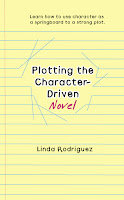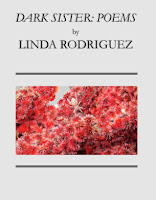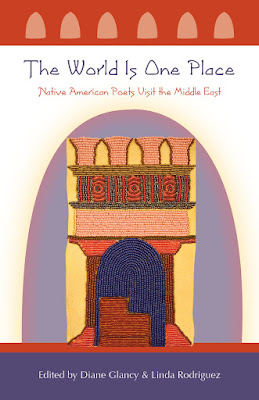Writers Don’t Come From Nowhere
by Linda Rodriguez
I’m a poet and novelist of Cherokee heritage
who writes about a Cherokee protagonist and also reviews books, so people send
me just about every novel written that has a major Indigenous character in it.
A terrifying number of them are romances with generic spray-tanned hunks on the
cover, love interests who are half-Cherokee, half-Navajo, half-Sioux, or just
plain half-Indian (these authors don’t seem to know any other of the 500+ tribes
exist) and written without the least tiny bit of knowledge of any of these
different cultures.
who writes about a Cherokee protagonist and also reviews books, so people send
me just about every novel written that has a major Indigenous character in it.
A terrifying number of them are romances with generic spray-tanned hunks on the
cover, love interests who are half-Cherokee, half-Navajo, half-Sioux, or just
plain half-Indian (these authors don’t seem to know any other of the 500+ tribes
exist) and written without the least tiny bit of knowledge of any of these
different cultures.
I also get contacted repeatedly by people
who want me to give them a crash course in being Cherokee (or even just Native)
because they’ve decided to make the protagonists of their books, or even a
whole series, Cherokee (or just Native). These are people who know nothing
about the Cherokee, not even the most basic information, and apparently have no
Cherokee friends or acquaintances. My attitude toward them, I’m afraid, is not
much more sympathetic than toward the authors wanting reviews for their books with
“Native” characters. Basically, these folks are saying to me, “I want an
‘exotic Indian’ protagonist and the Cherokee are the most famous tribe, so I’ll
choose them, but I have no real interest in the culture or knowing anyone in
it. I’m too lazy to do any research on the most documented tribe in American
history (the Cherokee were over 90%
literate in their own written language and had a bilingual newspaper long
before the Removal in the 1830s), so please do my research for me—and maybe
I’ll use it or maybe I’ll just do what I want to do, whether it’s true to the
culture or not, while putting your name down as the ‘expert’ I consulted.
Because I clearly don’t give a real damn.”
who want me to give them a crash course in being Cherokee (or even just Native)
because they’ve decided to make the protagonists of their books, or even a
whole series, Cherokee (or just Native). These are people who know nothing
about the Cherokee, not even the most basic information, and apparently have no
Cherokee friends or acquaintances. My attitude toward them, I’m afraid, is not
much more sympathetic than toward the authors wanting reviews for their books with
“Native” characters. Basically, these folks are saying to me, “I want an
‘exotic Indian’ protagonist and the Cherokee are the most famous tribe, so I’ll
choose them, but I have no real interest in the culture or knowing anyone in
it. I’m too lazy to do any research on the most documented tribe in American
history (the Cherokee were over 90%
literate in their own written language and had a bilingual newspaper long
before the Removal in the 1830s), so please do my research for me—and maybe
I’ll use it or maybe I’ll just do what I want to do, whether it’s true to the
culture or not, while putting your name down as the ‘expert’ I consulted.
Because I clearly don’t give a real damn.”
Indigenous cultures have been
misrepresented by Anglo anthropologists and folklore collectors for centuries.
An awful lot of books, especially novels, written by outsiders to a culture end
up written from the viewpoint of caricatures rather than real people, and the
culture is presented as a collection of stereotypes of that culture (often
derived from those misrepresenting researchers). These books almost always, in
one way or another, diminish or denigrate those cultures.
misrepresented by Anglo anthropologists and folklore collectors for centuries.
An awful lot of books, especially novels, written by outsiders to a culture end
up written from the viewpoint of caricatures rather than real people, and the
culture is presented as a collection of stereotypes of that culture (often
derived from those misrepresenting researchers). These books almost always, in
one way or another, diminish or denigrate those cultures.
Still, as writer/editor, Bob Stewart, once
said, “Writers don’t come from nowhere.” He’s absolutely correct in saying
that, and it speaks to a constant problem I see with manuscripts. Among other
things I do to make what is laughingly called a living, I screen manuscripts
for several national book contests, evaluate manuscripts for several university
or small presses, and review fellowship application packets for two artist
residencies. One of the problems I constantly encounter when reading slush pile
or contest entries or fellowship application manuscripts is the writer who
seems to come from nowhere and to exist in no particular space in the world.
said, “Writers don’t come from nowhere.” He’s absolutely correct in saying
that, and it speaks to a constant problem I see with manuscripts. Among other
things I do to make what is laughingly called a living, I screen manuscripts
for several national book contests, evaluate manuscripts for several university
or small presses, and review fellowship application packets for two artist
residencies. One of the problems I constantly encounter when reading slush pile
or contest entries or fellowship application manuscripts is the writer who
seems to come from nowhere and to exist in no particular space in the world.
Unfortunately, I read a lot of manuscripts
with good technique but no life, and with no roots, history, or culture to feed
them, they’re not likely to ever develop any. These writers are trying to be
universal, I suppose, but they haven’t learned the lesson that the specific and
particular embody the universal and make it come to life.
with good technique but no life, and with no roots, history, or culture to feed
them, they’re not likely to ever develop any. These writers are trying to be
universal, I suppose, but they haven’t learned the lesson that the specific and
particular embody the universal and make it come to life.
Everyone comes from somewhere. Perhaps
from an urban slum, perhaps from a pristine upscale suburb, perhaps from an
up-and-down series of foster homes, perhaps from great wealth or poverty or
anything in between. Everyone comes from some place, some culture, some family.
Somewhere where people talk and think a certain way and hold certain
expectations. Too many otherwise good manuscripts, however, exist in limbo, in
a cultural vacuum.
from an urban slum, perhaps from a pristine upscale suburb, perhaps from an
up-and-down series of foster homes, perhaps from great wealth or poverty or
anything in between. Everyone comes from some place, some culture, some family.
Somewhere where people talk and think a certain way and hold certain
expectations. Too many otherwise good manuscripts, however, exist in limbo, in
a cultural vacuum.
I suspect, in part, this has become so
prevalent because writers think their own backgrounds are not interesting or
“exotic” enough. It seems to me that
America has a paradoxical relationship with difference.
We fear and hate the different, the Other, but we also exoticize it, investing
it with greater interest and excitement than ourselves. These attitudes are
actually two sides of the same coin since exoticizing the Other renders it even
more foreign and Other and thus worthy of fear and hate. The result for writers,
however, is that many writers feel their own backgrounds can never match the
interest of the Other.
prevalent because writers think their own backgrounds are not interesting or
“exotic” enough. It seems to me that
America has a paradoxical relationship with difference.
We fear and hate the different, the Other, but we also exoticize it, investing
it with greater interest and excitement than ourselves. These attitudes are
actually two sides of the same coin since exoticizing the Other renders it even
more foreign and Other and thus worthy of fear and hate. The result for writers,
however, is that many writers feel their own backgrounds can never match the
interest of the Other.
One evening at a lively, crowded Latino
Writers Collective event, a young woman was talking with two of us and the
half-Iranian wife of another member. This young woman lamented that she had no
culture to draw on for her creative work and wished she were Latino or Native
American or Middle Eastern since that would give her cultural richness to write
about.
Writers Collective event, a young woman was talking with two of us and the
half-Iranian wife of another member. This young woman lamented that she had no
culture to draw on for her creative work and wished she were Latino or Native
American or Middle Eastern since that would give her cultural richness to write
about.
As I questioned her, however, I found that
her father had come from Norway as a young child with his parents and her
mother’s father emigrated as an adult from the Ukraine—two places rich with
history, art, culture—but she knew nothing about them, had pretty much scorned
them. I recommended she learn about
where and what she came from instead of wishing she were someone else, someone
“exotic.” These cultures and the upper Midwestern place in which she’d grown up
were her donnée, her given.
her father had come from Norway as a young child with his parents and her
mother’s father emigrated as an adult from the Ukraine—two places rich with
history, art, culture—but she knew nothing about them, had pretty much scorned
them. I recommended she learn about
where and what she came from instead of wishing she were someone else, someone
“exotic.” These cultures and the upper Midwestern place in which she’d grown up
were her donnée, her given.
In a wonderful short story, Daniel Chacón
has a Native American character and a
Latino character—the only students of color in their MFA program—discuss their
fellow students at a party: “They don’t even recognize what’s good about their
own cultures, so how can they recognize it with anyone else’s?” one says to the
other.
has a Native American character and a
Latino character—the only students of color in their MFA program—discuss their
fellow students at a party: “They don’t even recognize what’s good about their
own cultures, so how can they recognize it with anyone else’s?” one says to the
other.
All writers have roots, the details of
memory and obsession that make up their backgrounds and their finest, most
charged material. I know a gifted poet who grew up in a trailer in a mining
town in the Appalachians. Rachel has struggled to get an education, ending up
with a Ph.D. from a highly regarded university. Always, she felt looked-down-upon
because of her hillbilly background and accent.
memory and obsession that make up their backgrounds and their finest, most
charged material. I know a gifted poet who grew up in a trailer in a mining
town in the Appalachians. Rachel has struggled to get an education, ending up
with a Ph.D. from a highly regarded university. Always, she felt looked-down-upon
because of her hillbilly background and accent.
Instead of running from it as many have
and trying to pretend to be from one of those upscale suburbs, when Rachel
writes, she writes powerful poems from those very roots. And her poems are compelling
in large part because of
those roots. She writes about the prejudice she’s run into all her life, about
the poverty and ignorance she left behind, but she writes also about the good
in her culture, the richness and humor of the stories, about the art (mostly
unrecognized as such by mainstream America), and about her family.
and trying to pretend to be from one of those upscale suburbs, when Rachel
writes, she writes powerful poems from those very roots. And her poems are compelling
in large part because of
those roots. She writes about the prejudice she’s run into all her life, about
the poverty and ignorance she left behind, but she writes also about the good
in her culture, the richness and humor of the stories, about the art (mostly
unrecognized as such by mainstream America), and about her family.
Roots isn’t just a
miniseries. Ancestral culture is something we all have, whether we know it or
not. It’s a little easier for those of us who can’t escape it because of the
faces, eyes, and hair in our mirrors or the names or accents that set us apart
from the mainstream. For us, it becomes one of our obsessions because difference per se is an obsession with
most Americans. And because, too often, difference
equals less than to a number of
Americans. This fact, underlined by radio and television daily, leaves us scribbling
away to try and show that our people, our cultures, our languages are rich and
beautiful and not less than anyone
else’s.
miniseries. Ancestral culture is something we all have, whether we know it or
not. It’s a little easier for those of us who can’t escape it because of the
faces, eyes, and hair in our mirrors or the names or accents that set us apart
from the mainstream. For us, it becomes one of our obsessions because difference per se is an obsession with
most Americans. And because, too often, difference
equals less than to a number of
Americans. This fact, underlined by radio and television daily, leaves us scribbling
away to try and show that our people, our cultures, our languages are rich and
beautiful and not less than anyone
else’s.
We all have our own specific roots, though,
every one of us. And even if we’ve fought hard to escape from them, they leave
a lasting impact on us, on the way we use language, and on our worldview. Witness
F. Scott Fitzgerald who returned to the status of the once-poor outsider
futilely trying to enter the ranks of wealthy society and win the rich girl of
his dreams for his greatest work, The
Great Gatsby. If Fitzgerald had tried instead to write from the viewpoint
of someone born to that wealthy stratum of society, think what his novel would
have lost. If we try to whitewash our roots out of existence so we’ll fit in
better with the homogenized culture around us, we’ll inevitably shortchange our
work.
every one of us. And even if we’ve fought hard to escape from them, they leave
a lasting impact on us, on the way we use language, and on our worldview. Witness
F. Scott Fitzgerald who returned to the status of the once-poor outsider
futilely trying to enter the ranks of wealthy society and win the rich girl of
his dreams for his greatest work, The
Great Gatsby. If Fitzgerald had tried instead to write from the viewpoint
of someone born to that wealthy stratum of society, think what his novel would
have lost. If we try to whitewash our roots out of existence so we’ll fit in
better with the homogenized culture around us, we’ll inevitably shortchange our
work.
Increasingly in America, many of us are now
what the Indigenous community (using imposed BIA terminology) call mixed-blood,
what the Latino community (using imposed Spanish colonial terminology) call
mestizo. We can pass as homogenized, middle-class, white/Anglo Americans
(though many doing that are not really Anglo-Saxon, such as my friend of the
Norwegian-Ukrainian background).
what the Indigenous community (using imposed BIA terminology) call mixed-blood,
what the Latino community (using imposed Spanish colonial terminology) call
mestizo. We can pass as homogenized, middle-class, white/Anglo Americans
(though many doing that are not really Anglo-Saxon, such as my friend of the
Norwegian-Ukrainian background).
It’s almost always easier that way—leave
behind the non-Anglo-Saxon background, the poor or working-class background.
Leave behind the chance of ethnic slur (there’s one for just about every
non-English background). Leave behind the chance of socioeconomic slur (poor
white trash, trailer trash, redneck, anyone?). But I believe the decision to
leave our histories behind is a mistake. When we do this, we rob ourselves of
riches we can use to make our writing come alive.
behind the non-Anglo-Saxon background, the poor or working-class background.
Leave behind the chance of ethnic slur (there’s one for just about every
non-English background). Leave behind the chance of socioeconomic slur (poor
white trash, trailer trash, redneck, anyone?). But I believe the decision to
leave our histories behind is a mistake. When we do this, we rob ourselves of
riches we can use to make our writing come alive.
Two of the most powerful aspects of
writing that has a unique voice, writing that comes alive are detail—the detail
that only you would have noticed and invested with emotion—and obsession. The
best writers write from their obsessions, and obsessions start in childhood and
adolescence. They start back there in their family histories and the cultures
in which they grew up. Dorothy Allison and Sharon Olds grew up in familial
cultures of childhood sexual abuse. That’s one of the obsessions that fuel
their work, but each one’s work is still very different from the other’s because
they also grew up in different social cultures, Allison from a very poor rural
Southern background, Olds from a working-class urban Californian background.
writing that has a unique voice, writing that comes alive are detail—the detail
that only you would have noticed and invested with emotion—and obsession. The
best writers write from their obsessions, and obsessions start in childhood and
adolescence. They start back there in their family histories and the cultures
in which they grew up. Dorothy Allison and Sharon Olds grew up in familial
cultures of childhood sexual abuse. That’s one of the obsessions that fuel
their work, but each one’s work is still very different from the other’s because
they also grew up in different social cultures, Allison from a very poor rural
Southern background, Olds from a working-class urban Californian background.
We all come from several different
cultures at the same time—familial, social, educational—and these may change as
we grow and age. A friend of mine was born in Colombia and came to this country
as a young boy. When Joe arrived in this country, he and his brother knew no
English, so his mother, who had immigrated several years ahead of her children,
refused to speak Spanish with them, insisting they speak only English. Though Joe
has never lost his slight Spanish accent, he had to work hard as an adult to
regain his fluency in Spanish. His education was all in American schools and
universities, so, often, the topics of his poems and stories may not seem
outwardly Latino. He will write about classical Greek myths and classical
American myths, such as Hollywood stars, because these were part of the culture
in which he was educated and grew up. Still, Joe’s stories are also rooted in
the experience of that young boy whose mother left him with relatives for years
and would only speak a language he didn’t understand when they were finally
reunited in a strange, new country. Joe’s stories and poems are always rooted
in the experience of being an outsider, even in his own home.
cultures at the same time—familial, social, educational—and these may change as
we grow and age. A friend of mine was born in Colombia and came to this country
as a young boy. When Joe arrived in this country, he and his brother knew no
English, so his mother, who had immigrated several years ahead of her children,
refused to speak Spanish with them, insisting they speak only English. Though Joe
has never lost his slight Spanish accent, he had to work hard as an adult to
regain his fluency in Spanish. His education was all in American schools and
universities, so, often, the topics of his poems and stories may not seem
outwardly Latino. He will write about classical Greek myths and classical
American myths, such as Hollywood stars, because these were part of the culture
in which he was educated and grew up. Still, Joe’s stories are also rooted in
the experience of that young boy whose mother left him with relatives for years
and would only speak a language he didn’t understand when they were finally
reunited in a strange, new country. Joe’s stories and poems are always rooted
in the experience of being an outsider, even in his own home.
Language is a key to culture. Scientists
tell us that people with different languages think about the world in different
ways. Indian writer Bharati Mukherjee once spoke about this and about the way that
knowing multiple languages opens up your world because you learn to see the
world from different perspectives and experience reality differently depending
on the language which you are using as you experience it. She grew up in a
border area where everyone had to know four or more languages just to transact
the business of daily life. When she moved to the United States and later
Canada, she was amazed at the narrowness of thought she found among monolingual
North Americans.
tell us that people with different languages think about the world in different
ways. Indian writer Bharati Mukherjee once spoke about this and about the way that
knowing multiple languages opens up your world because you learn to see the
world from different perspectives and experience reality differently depending
on the language which you are using as you experience it. She grew up in a
border area where everyone had to know four or more languages just to transact
the business of daily life. When she moved to the United States and later
Canada, she was amazed at the narrowness of thought she found among monolingual
North Americans.
The language of your home will influence
the way you think even today. But we’ve all gone to college and learned to
homogenize that language or idiom out of any distinctiveness–so we won’t be
viewed as “low-class” or different in some other way. I know. I spent critical
growing-up years in Oklahoma. You can still hear a little Oklahoma in my
speech. When I was growing up, though, we called a “washcloth” a “warsh-rag”,
used “y’all” all the time, and instead of saying “I’ll pick you up” or “I’ll
give you a lift,” we said, “I’ll carry y’all to church with me next Sunday.” In
my memory are stocked a slew of phrases like that and other odd word usages.
They feed my writing.
the way you think even today. But we’ve all gone to college and learned to
homogenize that language or idiom out of any distinctiveness–so we won’t be
viewed as “low-class” or different in some other way. I know. I spent critical
growing-up years in Oklahoma. You can still hear a little Oklahoma in my
speech. When I was growing up, though, we called a “washcloth” a “warsh-rag”,
used “y’all” all the time, and instead of saying “I’ll pick you up” or “I’ll
give you a lift,” we said, “I’ll carry y’all to church with me next Sunday.” In
my memory are stocked a slew of phrases like that and other odd word usages.
They feed my writing.
I know. I know. It sounds like the old
“write what you know” stuff, doesn’t it? I don’t mean to set limits, however.
If you find yourself obsessed with some other culture in which you didn’t grow
up—the way John Steinbeck did with the Okies of the Dust Bowl—throw yourself
into that culture. Live with it and learn it. Steinbeck “embedded” himself with
the Okies as they trekked from Oklahoma to California and as they tried to live
in California. That’s the way he was able to write The Grapes of Wrath with such powerful authenticity.
“write what you know” stuff, doesn’t it? I don’t mean to set limits, however.
If you find yourself obsessed with some other culture in which you didn’t grow
up—the way John Steinbeck did with the Okies of the Dust Bowl—throw yourself
into that culture. Live with it and learn it. Steinbeck “embedded” himself with
the Okies as they trekked from Oklahoma to California and as they tried to live
in California. That’s the way he was able to write The Grapes of Wrath with such powerful authenticity.
Writers who ignore their own roots often
try to write from the viewpoint of someone very different from their own
experience—without bothering to learn much about that community. When you read
their work, you can tell immediately that they have no real basis in that
character’s world. It rings false, and that’s always a death knell for any
writer, whether poet, writer of fiction or nonfiction.
try to write from the viewpoint of someone very different from their own
experience—without bothering to learn much about that community. When you read
their work, you can tell immediately that they have no real basis in that
character’s world. It rings false, and that’s always a death knell for any
writer, whether poet, writer of fiction or nonfiction.
If you’re going to write from inside a
character from a different culture, spend real time in that culture with its
people. Talk with them, but more importantly, listen to them. Ask questions.
Learn the culture. I guess it is the old command of “write what you know,” after
all, or rather, what you have taken the time to learn about.
character from a different culture, spend real time in that culture with its
people. Talk with them, but more importantly, listen to them. Ask questions.
Learn the culture. I guess it is the old command of “write what you know,” after
all, or rather, what you have taken the time to learn about.
My advice is to root yourself as a writer.
Go back to your own origins. Mine your memories, seeking those
emotion-freighted, telling details and your own obsessions. Learn about your
own history and culture—all of it if you’re a mix of more than one, as most of
us are. Remember the language and idiom of your earliest family. And if you
want to write about cultures and people foreign to your experience, root
yourselves just as deeply in those also.
Go back to your own origins. Mine your memories, seeking those
emotion-freighted, telling details and your own obsessions. Learn about your
own history and culture—all of it if you’re a mix of more than one, as most of
us are. Remember the language and idiom of your earliest family. And if you
want to write about cultures and people foreign to your experience, root
yourselves just as deeply in those also.
Find your roots as a writer, and I believe
you will find your voice. Isn’t that what we all look for when we read—a unique
and distinctive voice that allows us to see the world in a way that’s slightly
different from the way anyone else does? What’s the old adage about giving your
children roots and wings? Well, give your writing roots, and you’ll give it a
chance to take flight.
you will find your voice. Isn’t that what we all look for when we read—a unique
and distinctive voice that allows us to see the world in a way that’s slightly
different from the way anyone else does? What’s the old adage about giving your
children roots and wings? Well, give your writing roots, and you’ll give it a
chance to take flight.
 Linda Rodriguez’s 11th book, Fishy Business: The Fifth
Linda Rodriguez’s 11th book, Fishy Business: The FifthGuppy Anthology (edited), was recently published. Dark Sister: Poems
is her 10th book and was a finalist for the Oklahoma Book Award. Plotting
the Character-Driven Novel, based on her popular workshop, and The World
Is One Place: Native American Poets Visit the Middle East, an anthology she
co-edited, were published in 2017. Every
Family Doubt, her fourth mystery featuring Cherokee detective, Skeet
Bannion, and Revising the Character-Driven Novel will be published in 2020.
Her three earlier Skeet novels—Every
Hidden Fear, Every Broken Trust, Every Last Secret—and earlier books of
poetry—Skin Hunger and Heart’s Migration—have received critical
recognition and awards, such as St. Martin’s Press/Malice Domestic Best First
Novel, International Latino Book Award, Latina Book Club Best Book of 2014,
Midwest Voices & Visions, Elvira Cordero Cisneros Award, Thorpe Menn Award,
and Ragdale and Macondo fellowships. Her short story, “The Good Neighbor,”
published in Kansas City Noir, has
been optioned for film.
Rodriguez is past chair of the AWP Indigenous Writer’s
Caucus, past president of Border Crimes chapter of Sisters in Crime, founding
board member of Latino Writers Collective and The Writers Place, and a member
of International Thriller Writers, Native Writers Circle of the Americas,
Wordcraft Circle of Native American Writers and Storytellers, and Kansas City Cherokee
Community. Learn more about her at http://lindarodriguezwrites.blogspot.com
Caucus, past president of Border Crimes chapter of Sisters in Crime, founding
board member of Latino Writers Collective and The Writers Place, and a member
of International Thriller Writers, Native Writers Circle of the Americas,
Wordcraft Circle of Native American Writers and Storytellers, and Kansas City Cherokee
Community. Learn more about her at http://lindarodriguezwrites.blogspot.com












Good advice. A friend told of a workshop with students in Alaska, who complained that "nothing ever happens here." Just then, a huge bear began clawing at the window of the library. "Oh that? That happens all the time." Missing so much by taking it for granted. <3